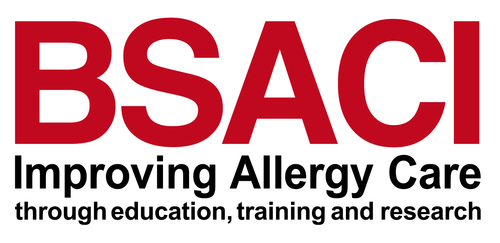Delays in supporting ‘UK Fatal Anaphylaxis Registry’, puts more lives at risk.
With the inquest into the death of Celia Marsh who died in December 2017 concluding on Thursday 22nd September, the British Society for Allergy & Clinical Immunology (BSACI) is again calling for additional funding for the Fatal Anaphylaxis Registry (UKFAR).
Celia tragically died after eating a pre-packaged vegan sandwich. She was known to have a cow’s milk allergy. Maria Voisin, Senior Coroner for Avon, “concluded Celia suffered an anaphylactic shock”.
In 2020 The British Society for Allergy & Clinical Immunology (BSACI) in collaboration with Manchester Foundation Trust (MFT) received a one-off grant of GBP100,000 from the Foods Standards Agency (FSA) to support the development of a Fatal Anaphylaxis Registry. The registry employs experts who collect and analyse data from deaths that have been recorded as anaphylaxis to identify patterns of events so that we may understand more about what causes people to die from anaphylaxis and improve survival rates. To continue its work, more funding is needed on a sustainable basis.
Fiona Rayner, BSACI Chief Executive states;
“Sadly, these cases are becoming more frequent and understanding why these fatalities occur, and to reduce deaths, the medical profession needs to understand the mechanisms by which anaphylaxis becomes lethal. It is important to accurately count and study each death from anaphylaxis. This has been recognised, and recommended by, HM Coroners (3).”
“The one-off grant from the Food Standards Agency (FSA) will run out by the end of the year. Long-term funding is needed to sustain and analyse retrospective cases as well as prospective cases, as its critical to be able to reduce the number of deaths in the future. The BSACI have been working with the Food Standards Agency (FSA) to secure funding from the Department of Health and Social Care (DHSC) and are awaiting to hear the outcome of a proposal to support the UK Fatal Anaphylaxis Registry.”
Lead Investigator on the UK Fatal Anaphylaxis Registry Dr Vibha Sharma explains:
“The UKFAR is unique in the kind of information it can collect and retain. This registry has been informative for allergic individuals and for those involved in their management. There is still a lot that remains ill understood. We are aware that anaphylaxis is common but deaths from anaphylaxis are rare. Why some die and many recover is ill understood. Continued detailed review of each case of fatal anaphylaxis is likely to enhance our understanding and help avoid future deaths.”
Each case of fatal anaphylaxis is unique. Learning lessons from each of these deaths is important. Attempts must be made to learn from each of these cases. Early involvement of UKFAR in assessment of suspected fatal anaphylactic events will facilitate collaboration for important data, evidence gathering to help identify contributing factors, and focus on relevant post-mortem assessments.”
Calls for the ongoing funding of the UK Fatal Anaphylaxis Registry were also echoed by UK allergy charities Allergy UK and Anaphylaxis UK that both support people living with allergies.
Carla Jones, CEO of Allergy UK, the leading national charity for people living with all types of allergy, comments, “Our most heartfelt condolences go out to the family of Celia Marsh for whom this inquest has undoubtedly resurrected the devastation of such a needless and tragic death of a loved one. We continue to be faced with a society that doesn’t take allergy seriously, which is why we urge the call to be heard for a UK Fatal Anaphylaxis Registry to be introduced without further delays. It is a crucial step in helping to ensure the risks of this happening to anyone again in the future are significantly reduced.”
Sarah Baker, Head of Health Policy and Developments at Anaphylaxis UK, said “We would like to offer our heartfelt and deepest sympathies to the family of Celia Marsh at this difficult time. It is vitally important we learn the lessons from such tragic events and prevent any more needless deaths from anaphylaxis.”
ENDS
Additional information:
1. The British Society for Allergy & Clinical Immunology (BSACI) is the national, professional and academic society which represents the specialty of allergy at all levels. Its aim is to improve the management of allergies and related diseases of the immune system in the United Kingdom, through education, training and research. BSACI Website
For more information contact: info@bsaci.org
2. Allergy UK, the operational name of the British Allergy Foundation, is the leading national charity which provides information and support to people living with allergies, working with healthcare professionals and KOLs to help advance research, diagnosis and treatment. Allergy UK acts as the 'voice' of the UK’s millions of people with allergy, representing the views and healthcare needs of those affected by this multi-organ disease. For more information visit Allergy UK
3. Recording accounts of first aiders, by-standers and paramedics to get a clear picture of the events as they unfolded. Details such as what the person reported experiencing, how they appeared, if there was a change in posture, which treatments were given (when, the route and site of treatments administered). The route and site of adrenaline administration is particularly important to record as adrenaline should be delivered into the muscle before cardio-vascular collapse for effective circulation to areas of critical sensitivity to the drug.
4. A referral can be made for UK Fatal Anaphylaxis Register and for further details visit BSACI resources
5. Anaphylaxis UK is the only UK-wide charity operating solely for the growing numbers of people at risk of serious allergic reactions and anaphylaxis. Visit Anaphylaxis UK
